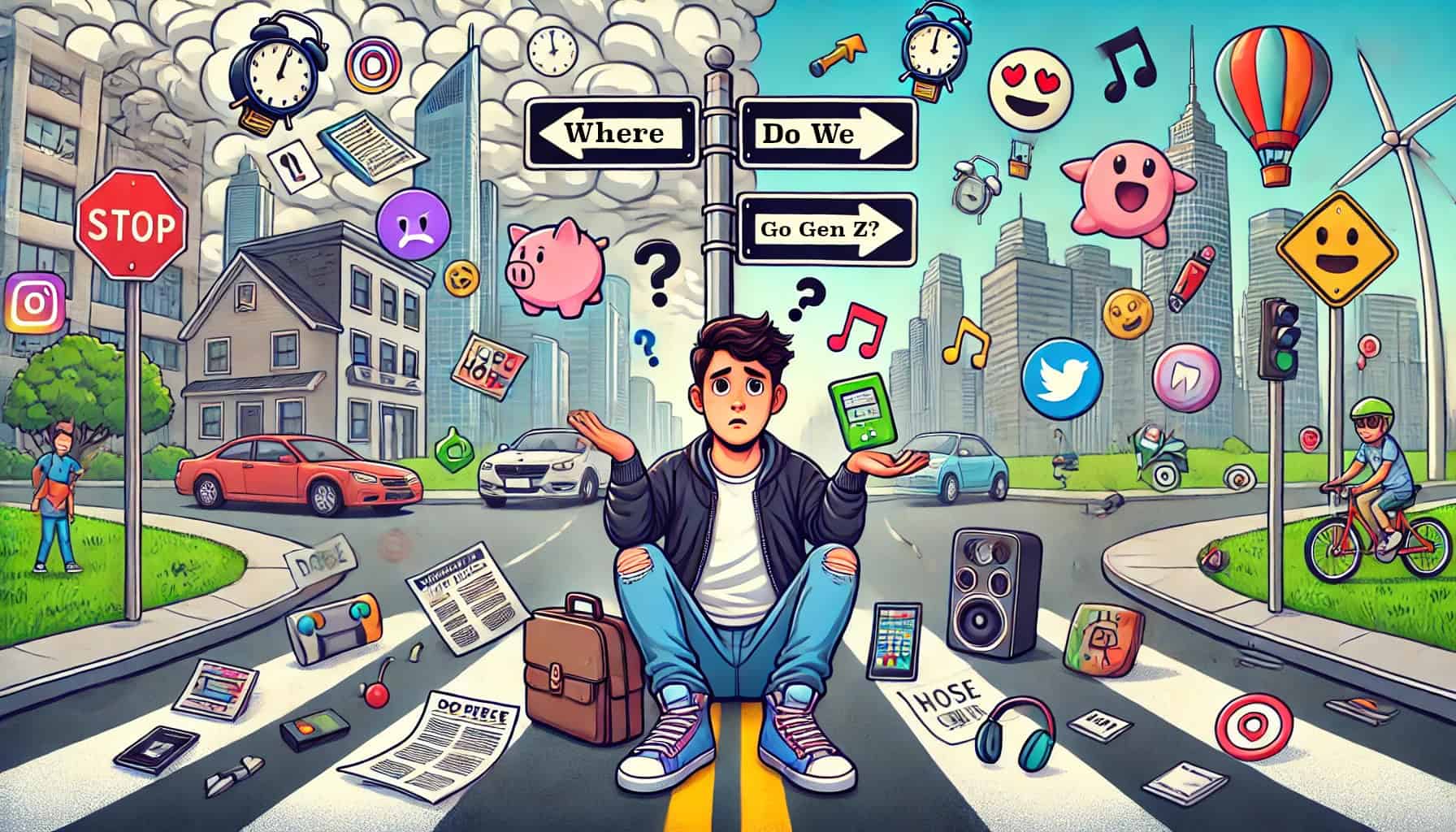Building Success Amidst Hardship: How Gen Z Can Thrive
The concept of “adulting” has become a popular term among millennials and Gen Z, encapsulating the myriad responsibilities and milestones associated with growing up. Traditionally, adulthood was marked by events like moving out of the family home, achieving financial independence, starting a career, and perhaps beginning a family. However, for Generation Z—those born between the mid-1990s and early 2010s—these traditional markers are shifting dramatically.
A recent survey of adults across four generations revealed that only 11% of Gen Zers feel like real adults, with many redefining the true start of adulthood as age 27 rather than 18. This shift isn’t due to a lack of ambition or prolonged adolescence but is a realistic response to the rising cost of living and unique economic challenges they face today.
The Rising Cost of Living
One of the most significant factors influencing this redefinition is the escalating cost of living. According to the survey, 72% of respondents agree that “adulting” is harder than it once was, primarily due to financial constraints. Essential expenses such as housing, education, healthcare, and transportation have increased substantially over the past few decades, often outpacing wage growth.
For instance, housing prices have soared in many urban areas where job opportunities are concentrated. The median price of homes in major cities has increased by over 50% in the last decade alone. Renting isn’t necessarily a more affordable option either, with rental rates climbing steadily and consuming a significant portion of young adults’ income.
Student loan debt adds another layer of financial burden. The average student loan debt for recent graduates hovers around $30,000, affecting their ability to save, invest, or make large purchases like homes and cars. This debt influences career choices, often pushing graduates towards higher-paying jobs that may not align with their passions or long-term goals.
Moreover, wage stagnation has compounded these issues. While the cost of living has increased, wages have not kept pace, especially for entry-level positions. This discrepancy makes financial independence more challenging to achieve, prompting many young adults to reconsider traditional timelines for reaching adulthood milestones.
Redefining Adulthood
In response to these economic realities, Gen Z is redefining what it means to be an adult. Instead of adhering to traditional timelines, they focus on personal development, mental health, and building resilience. Adulthood is increasingly seen as a state of mind characterized by adaptability and self-awareness rather than a checklist of external milestones achieved by a certain age.
Case Study: Emma’s Journey to Adulthood
Emma, a 24-year-old college graduate, moved back in with her parents after completing her degree. “I used to think that moving out immediately was the only way to prove I was an adult,” she says. “But with student loans and the high cost of living, staying with my parents allows me to save money and plan for the future.” Emma represents a growing number of young adults making strategic choices to ensure long-term financial stability.
This pragmatic approach extends to career choices as well. Gen Z is more likely to pursue jobs that offer flexibility, align with their values, and contribute to personal growth. The traditional notion of a stable, long-term job with one company is less appealing. Instead, they prioritize opportunities that provide skill development and align with their personal and professional goals.
The Role of Technology
Technology has been a double-edged sword for Gen Z. On one hand, it has created new economic opportunities through the gig economy, remote work, and entrepreneurship. Platforms like freelancing websites and remote job boards have enabled young adults to find work that fits their lifestyle and financial needs.
Example: Leveraging the Gig Economy
John, a 22-year-old graphic designer, balances multiple freelance projects through online platforms. “I have the freedom to choose projects that interest me and set my own schedule,” he explains. “It allows me to earn a living while pursuing my passion.” This flexibility is highly valued among Gen Z, who often seek alternatives to the traditional 9-to-5 job.
On the other hand, technology has contributed to job market competitiveness. Automation and artificial intelligence are changing the employment landscape, leading to uncertainty about future career paths. Gen Z must be adaptable, continuously updating their skills to stay relevant in a rapidly evolving job market.
Additionally, technology provides access to resources and communities that can aid in navigating adulthood. Online forums, social media groups, and educational platforms offer support and information on everything from financial literacy to mental health.
Financial Literacy and Planning
Recognizing the economic challenges they face, many Gen Zers are proactively improving their financial literacy. Resources like financial education platforms and apps are popular tools among young adults seeking to manage their finances effectively.
Financial Tools Popular Among Gen Z:
- Budgeting Apps: Help track expenses, set budgets, and achieve financial goals.
- Investment Platforms: Offer accessible investment options for beginners.
- Financial Education Websites: Provide courses and resources on personal finance and investing.
Financial planning is no longer viewed as something to address later in life. Instead, Gen Z is keenly aware of the importance of budgeting, saving, and investing from an early age. Workshops, online courses, and even social media influencers contribute to this trend, making financial education more accessible and engaging.
Mental Health Awareness
The pressures of navigating adulthood amidst economic uncertainty have led to increased stress and anxiety among young adults. However, Gen Z is more open about discussing mental health than previous generations. There is a strong emphasis on self-care, therapy, and seeking support when needed.
Statistics on Mental Health Among Gen Z:
- Anxiety and Depression: Studies indicate higher rates of anxiety and depression among Gen Z compared to older generations.
- Seeking Help: There is a significant increase in young adults utilizing mental health services.
Organizations and apps offering mental health support have seen increased engagement from young adults. This openness helps reduce the stigma around mental health issues and encourages individuals to prioritize their well-being.
Social and Environmental Consciousness
Gen Z is distinguished by their social and environmental consciousness. Issues like climate change, social justice, and equality are paramount concerns. This awareness influences their personal choices and expectations from employers.
Many young adults prefer to work for companies that demonstrate corporate social responsibility. They are more likely to support businesses that align with their values and contribute positively to society. This trend prompts companies to reevaluate their policies and practices to attract and retain young talent.
What Corporations Can Do
Businesses have a unique opportunity to support Gen Z as they navigate these challenges. By recognizing the shifting definitions of adulthood and the economic hurdles young adults face, corporations can implement policies that offer meaningful support.
- Flexible Work Arrangements: Remote work options, flexible hours, and project-based assignments help employees balance work with personal development and other responsibilities.
- Financial Wellness Programs: Offering resources on financial planning, student loan assistance, or budgeting workshops can alleviate financial stress. Companies could partner with financial advisors to provide free consultations or offer matching contributions to savings plans.
- Career Development Opportunities: Clear pathways for advancement, mentorship programs, and opportunities for skill development can attract and retain Gen Z talent. Providing access to online courses, certifications, and professional development workshops demonstrates an investment in their future.
- Emphasize Corporate Social Responsibility: Companies that actively engage in social and environmental initiatives resonate more with Gen Z employees. Implementing sustainable practices, supporting community projects, and fostering an inclusive workplace culture are essential.
A Facetious Note with a Serious Underpinning
In a recent LinkedIn post, I jokingly suggested that corporations should upgrade their pizza Fridays to pizza Thursdays and Fridays. While this was said in jest, it underscores a genuine sentiment: businesses need to do more to support Gen Z employees navigating a challenging economic landscape. Small gestures can make a big difference in employee morale and satisfaction, but they must be part of a broader commitment to addressing the real issues at hand.
What Businesses Can Do to Help Gen Z
To truly support Gen Z, businesses can implement several strategies:
- Provide Financial Support:
- Competitive Compensation: Offer wages that reflect the cost of living and acknowledge the financial burdens young adults face.
- Student Loan Assistance: Implement programs to help employees pay down student debt.
- Financial Planning Resources: Provide access to financial advisors or workshops on budgeting and investing.
- Foster a Supportive Work Environment:
- Flexible Work Arrangements: Allow remote work options and flexible scheduling to accommodate diverse needs.
- Mental Health Resources: Offer employee assistance programs, counseling services, and promote a culture that prioritizes well-being.
- Inclusive Culture: Create a workplace that values diversity, equity, and inclusion.
- Invest in Professional Development:
- Career Advancement Opportunities: Provide clear pathways for growth within the company.
- Skill Development: Offer training programs, workshops, and access to learning platforms.
- Mentorship Programs: Connect younger employees with experienced mentors.
- Embrace Social Responsibility:
- Sustainable Practices: Implement environmentally friendly policies and practices.
- Community Engagement: Encourage and facilitate employee involvement in community service and social initiatives.
- Ethical Standards: Operate with transparency and integrity, aligning business practices with societal values.
Key Takeaways
Gen Z is navigating adulthood in a world that presents unprecedented economic challenges and opportunities. Their approach to adulthood is characterized by adaptability, resilience, and a redefinition of traditional milestones. By understanding these shifts, society—and particularly corporations—can better support young adults as they forge new paths into adulthood.
Supporting Gen Z requires a multifaceted approach that addresses financial constraints, mental health, career development, and social values. By aligning policies and practices with the needs and expectations of this generation, businesses can not only attract and retain talent but also contribute positively to the broader societal shift in defining adulthood.
Resources
- Financial Planning Tools
- Budgeting App: Helps users track expenses, set budgets, and achieve financial goals. [Insert Link]
- Investment Platform: Offers accessible investment options for beginners. [Insert Link]
- Financial Education Website: Provides courses and resources on personal finance and investing. [Insert Link]
- Mental Health Support
- Mental Wellness App: Offers guided meditations, stress management techniques, and mood tracking. [Insert Link]
- Online Counseling Service: Connects users with licensed therapists for virtual counseling sessions. [Insert Link]
- Support Community Forum: A platform for sharing experiences and advice on mental health. [Insert Link]
- Career Development
- Online Learning Platform: Offers courses to develop new skills and enhance career prospects. [Insert Link]
- Professional Networking Site: Connects professionals across industries for networking opportunities. [Insert Link]
- Mentorship Program: Pairs young professionals with experienced mentors in their field. [Insert Link]
- Social and Environmental Organizations
- Environmental Advocacy Group: Engages in initiatives to combat climate change and promote sustainability. [Insert Link]
- Social Justice Organization: Works towards equality and justice through programs and advocacy. [Insert Link]
This article is part of the SpeedyManateeWebsites blog series on navigating modern adulthood in Bradenton, FL. Stay tuned for more insights and resources to help you thrive in today’s world.
Ready to Connect with Gen Z in Bradenton?
If you’re a business owner in Bradenton looking to adapt to the evolving needs of Gen Z, SpeedyManateeWebsites is here to help. We specialize in creating engaging websites and digital solutions that resonate with young adults in our community. Our expertise can help you attract and retain Gen Z talent, enhance your online presence, and grow your business.
Contact Us Today
- Phone: (941) 779-5743
- Email: hello@speedymanateewebsites.com
Let’s work together to build a brighter future for Gen Z in Bradenton!

